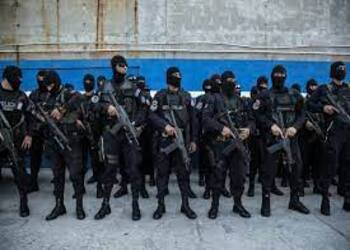A killing spree unlike anything seen since El Salvador’s civil war has delivered a macabre message from the country’s street gangs, which have learned that spikes in homicides speak to the government.
The country’s main gangs, the MS13 and Barrio 18, appeared to indiscriminately kill people – including vendors, bus passengers and market-goers – during three days of bloodshed that began with 14 killings on March 25.
The next day, authorities had tallied 62 further homicides, marking the deadliest day on record since the country’s civil war ended three decades ago. Eleven more people were murdered on March 27, for a total of 87 homicides in 72 hours.
Local press reported that gang members may have been instructed to leave bodies in plain sight. One corpse was visibly dumped on the side of a road.
SEE ALSO: Evidence of Gang Negotiations Belie El Salvador President’s Claims
The government’s response was immediate. On March 27, El Salvador’s legislative assembly approved President Nayib Bukele’s month-long state of exception, suspending constitutional rights such as freedom of assembly, and loosening rules on arrests. The measures also permit military roadblocks throughout the country.
El Salvador authorities later announced the arrest of over 570 gang members in the space of two days, including two leaders who had allegedly ordered the homicides, according to the national police and the country’s security minister.
The government also cracked down on gang members in prisons. On Twitter, El Salvador President Nayib Bukele announced that inmates in maximum security jails would be confined to their cells.
“Because of your actions, your ‘homeboys’ won’t see a single ray of sunlight,” the president said in the same March 27 Twitter post.
Bukele’s bellicose reaction came as the killing spree threatened to derail his administration’s gains in lowering the country’s homicide rate. The three days brought the number of homicides in El Salvador to 329 this year, 21 more than the same time period in 2021.
Bukele has taken full credit for the country’s recent drop in homicides and has denied negotiating with the gangs to keep the peace. His statements, however, have been undercut by the country’s Attorney General’s Office previously unearthing evidence of covert meetings between government officials and gang leaders behind bars. And last December, the US Treasury sanctioned El Salvador’s prison director and another top official for allegedly brokering pacts with the gangs.
InSight Crime Analysis
Rather than long wars with state authorities or each other, El Salvador’s gangs now appear to favor short bursts of indiscriminate violence.
The record-killing spree comes just months after a rampage left a trail of 46 bodies in a 72-hour period in November 2021. Another sudden spike in murders in April 2020, when dozens were killed, was the first sign of major gang unrest during Bukele’s time in office.
According to analysts, these brief spikes typically occur when there is a rupture in negotiations between the government and the gangs, with the gangs using bodies as bargaining chips.
“The gangs use their ability to alter the levels of violence as leverage to press the government into meeting certain demands,” said Tiziano Breda, Central American Analyst for the International Crisis Group.
But the “gangs don’t appear to be interested in disrupting the whole process,” he told InSight Crime. Rather, they are just interested “in making adjustments to it.”
SEE ALSO: Gangs, Vendors and Political Capital in Downtown San Salvador
The waves of violence avoid any protracted conflict with state actors. The gangs have avoided killing security forces during recent murder sprees, reflecting a long-term shift away from direct confrontation with the government. The unraveling of a previous gang truce led to an all-out war between gangs and security forces in the mid-2010s, with the sustained violence provoking a record homicide rate in 2015.
“We shouldn’t see it as the start of a war, but rather a cry for attention,” said Juan Martínez d’Aubuisson, a Salvadoran anthropologist and gang expert, adding that the gangs are likely using the killings to express discontent with secret government negotiations.
Martínez also said dissent within the MS13 rank and file may be behind the murder spike. While the gang has long used homicides to demand preferential treatment from the government, the benefits have largely remained with imprisoned gang leaders. Now, according to Martínez, low-level gang members may be using the same strategy to show their leaders they are unhappy with the negotiations.
“[The leaders] may be getting a taste of their own medicine,” said Martínez.

